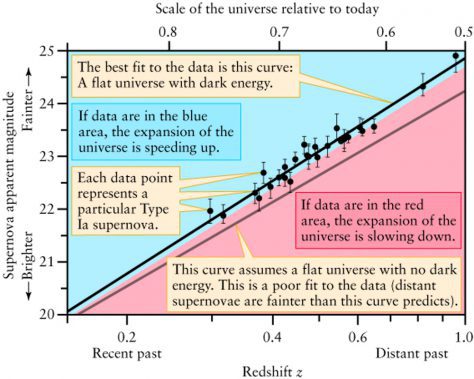
What I often see among atheists is this tendency to set up expectations of how God would have acted and then complain that he doesn’t met those expectations. I don’t think that this is a good way to argue against a religion, because it’s subjective. God isn’t obligated to comport with atheist expectations. A much better way of evaluating religions is to test the claims each makes against evidence.
So in this post, I wanted to show how a reasonable person can evaluate and reject different worldviews using evidence.
Falsifying a religion using science
Consider this argument:
- Hindu cosmology teaches that the universe cycles between creation and destruction, through infinite time.
- The closest cosmological model conforming to Hindu Scriptures is the eternally “oscillating” model of the universe.
- The “oscillating” model requires that the universe exist eternally into the past.
- But the evidence today shows the the universe, and time itself, had a beginning at the big bang.
- The “oscillating” model requires that the expansion of the universe reverse into a collapse, (= crunch).
- In 1998, the discovery of the year was that the universe would expand forever. There will be no crunch.
- Therefore, the oscillating model is disconfirmed by observations.
- The oscillating model also faces theoretical problems with the “bounce” mechanism.
Notice how the oscillating model is falsified by mathematics and experimental evidence. Remarkable, when you remember how the public schools would play Carl Sagan videos which promoted this no-Creator model of the universe.
The absolute origin of the universe out of nothing is also incompatible with atheism, Buddhism, Mormonism, etc. because they also require an eternally existing universe.
Atheism in particular is incompatible with the universe “coming into being”, because that would be a supernatural cause – a cause that created the natural world. According to the Secular Humanist Manifesto, atheism is committed to an eternally existing universe, (See the first item: “Religious humanists regard the universe as self-existing and not created.”). If something non-material brought all existing matter into being, that would be a supernatural cause, and atheists deny that anything supernatural exists. The standard Big Bang theory requires that all the matter in the universe come into being out of nothing.
Falsifying a religion using history
Consider this argument:
- To be a Muslim, you must believe that the Koran is without error.
- The Koran claims that Jesus did not die on a cross. (Qur’an, 4: 157-158)
- The crucifixion of Jesus is undisputed among non-Muslim historians, including atheist historians.
- Therefore, it is not rational for me to become a Muslim.
I’m going to support the premise that Jesus was crucified by citing historians from all backgrounds.
Consider some quotes from the (mostly) non-Christian scholars below:
“Jesus’ death as a consequence of crucifixion is indisputable.” Gert Lüdemann
“That he was crucified is as sure as anything historical can ever be.” J.D. Crossan
“The passion of Jesus is part of history.” Geza Vermes
Jesus’ death by crucifixion is “historically certain”. Pinchas Lapide
“The single most solid fact about Jesus’ life is his death: he was executed by the Roman prefect Pilate, on or around Passover, in the manner Rome reserved particularly for political insurrectionists, namely, crucifixion.” Paula Fredriksen
“The support for the mode of his death, its agents, and perhaps its co-agents, is overwhelming: Jesus faced a trial before his death, was condemned, and was executed by crucifixion.” L.T. Johnson
“One of the most certain facts of history is that Jesus was crucified on orders of the Roman prefect of Judea, Ponitus Pilate.” Bart Ehrman
That’s 7 famous historians: 3 atheists, 3 Jews and 1 moderate Catholic. The atheists, Ludemann, Crossan and Ehrman, have all debated against the resurrection of Jesus with William Lane Craig. Johnson is the moderate Catholic, the rest are Jewish historians. The Koran was written in the 7th century. That is why no professional historian accepts the Koran as more authoritative than the many earlier Christian and non-Christian sources for the crucifixion story. Many of the sources for the crucifixion are dated to the 1st century. It’s not faith. It’s history.
I have seen debates with Muslim scholars, and I have never once heard them cite a non-Muslim historian to the effect that Jesus was not crucified. To my knowledge, there is no (non-Muslim) historian who denies the crucifixion of Jesus in his published work.
Can Christianity be falsified by science or history?
Yes. If you prove that the universe is eternal than would falsify the Bible’s claim that God created the universe out of nothing. That would be a scientific disproof. If you could find the body of Jesus still inside a tomb, that would falsify the Bible’s claim about a resurrection. That would be a historical disproof. The nice thing about Christianity is that we make lots of testable claims. When someone claims to be a Christian, it’s a good thing if they can show how they arrived at that conclusion. Being able to square God’s existence with science, and Jesus’ resurrection with history are two crucial steps to showing the reasonableness of Christianity.
